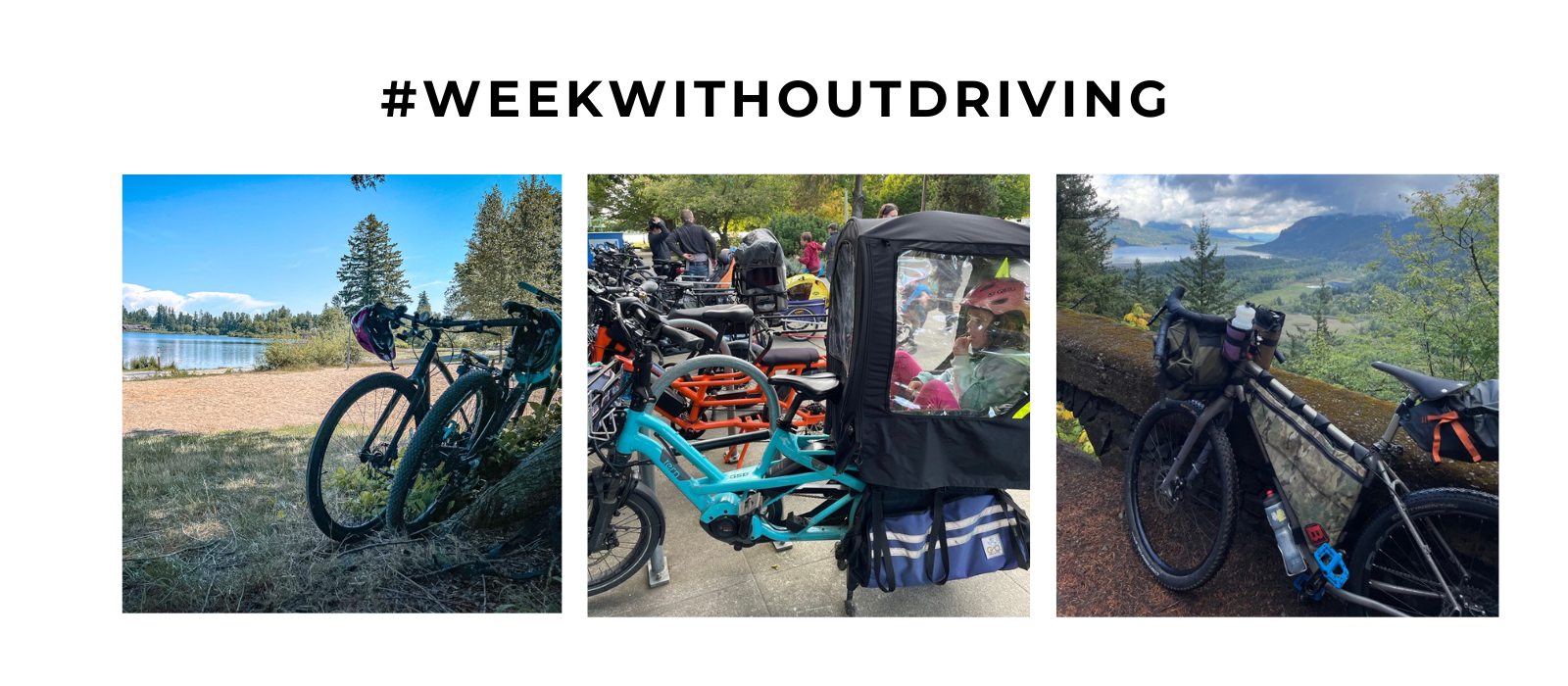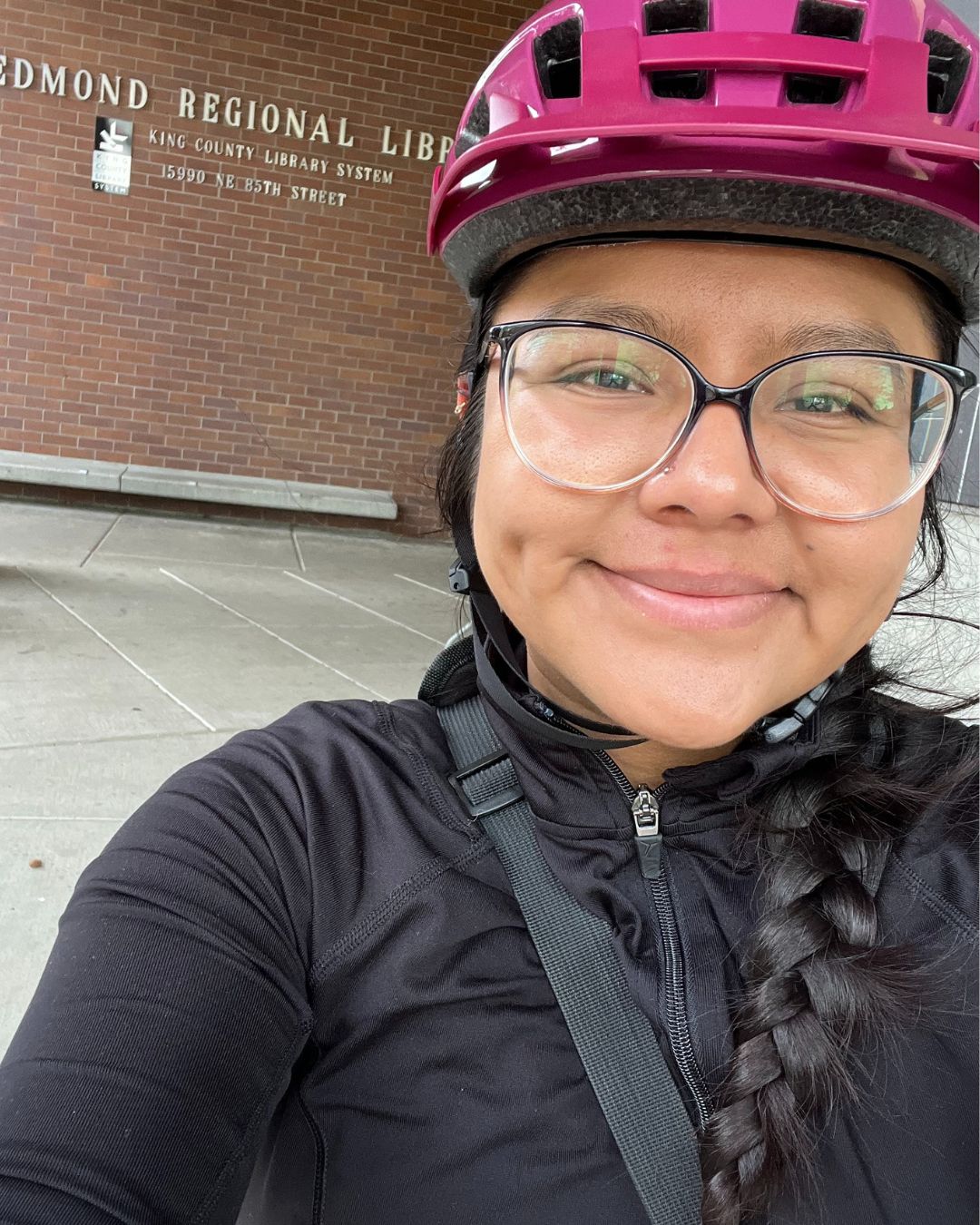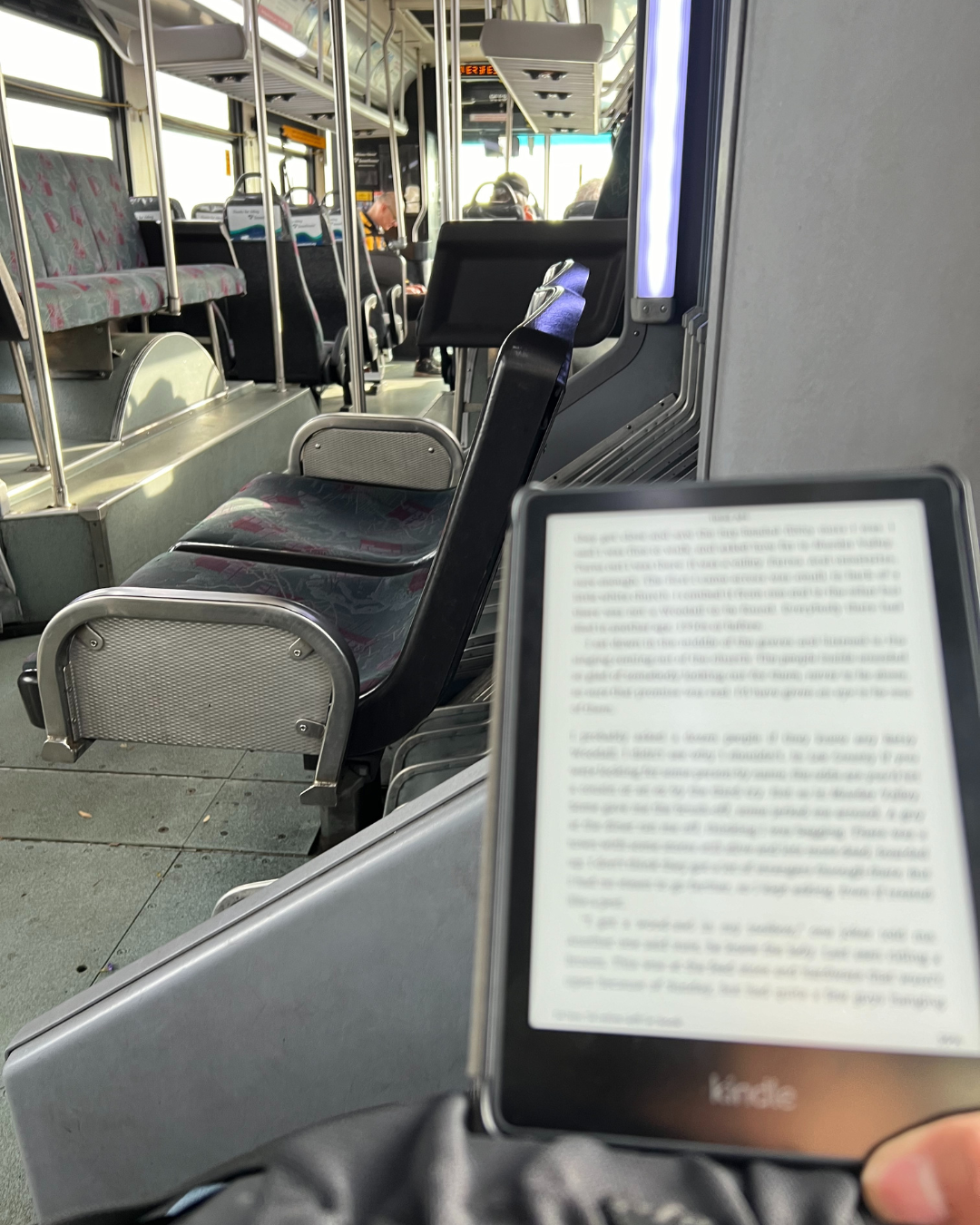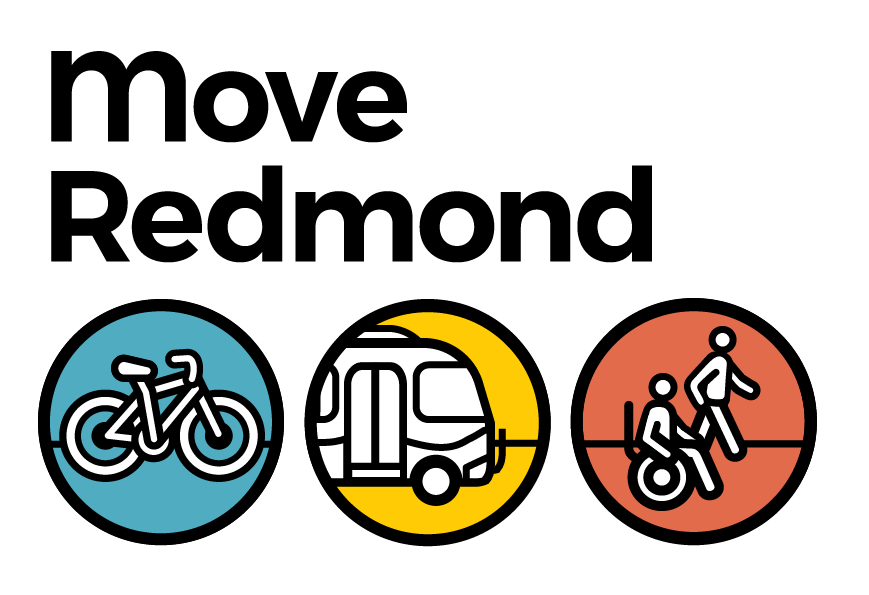
Our #WeekWithoutDriving Reflections
By Kelli Refer, Michael Leach, Maritza Lauriano
Kelli Refer, Move Redmond Executive Director:
I’ve been a non-driver for over a decade. I hesitate to say it was all by choice. When I sold my car in early 2011 I was working multiple part time jobs and the insurance and gas costs were eating into my already tight budget. On top of that driving was not something that brought out the best in me, I found myself nervous and anxious especially on highways where people were traveling at deadly speeds.
Fast forward to today and I’ve been happily car free since then, so #WeekWithoutDriving is my norm. I’ve learned a lot about navigating the region by transit and bicycle. I’ve been reflecting a lot about the cost of being car free. What do you give up? What do you gain? Time is lost, but connection is gained.

Driving a car is often the fastest way to travel. Especially on a regional level. Some trips become too far and too long to take by transit or bike, so I simply don’t go. As a car-free family there are things we say no to: the birthday party across town, enrolling my child in activities that are too far away. it is highly unlikely we will really have the travel time or energy.
But what do we really have time for? Time to be stuck in traffic? Time to mitigate the harm of climate change? Do we value time so much that we make our streets deadly and cause the ocean irreparable harm? (I’m looking at you microplastics from tires!) Do we value squeezing so much productivity into a day that we lose our humanity and ability to connect with others?
There is so much I love about shifting our habits and transportation – it pushes back on these notions of what is productive. Moving my body on my bike or walking is beneficial to my heart and my soul. Riding the bus and connecting with strangers strengthens the community connections that tie us together. Yes, I get it. Sometimes I look at my schedule and I am stumped at how to get from a meeting in Redmond, to a lunch in Bellevue and then get back in time to take my child to swim lessons. It is not easy. I am on the bus a lot and I do a lot of work en route to places. My friend and inspiration, Dr. Adonia Lugo talks about how buses are public spaces – basically parks on wheels and because of this we have the opportunity to witness all kinds of human experiences.
Another side effect of being car-free is that our family relies on carpooling, this is especially true for recreational activities like going to the mountains or some other kind of adventure. When you are car-lite or car-free, the carpool requires a certain level of vulnerability and coordination. It pushes back on the narrative that we all must be so self-reliant and get ourselves places by ourselves. It can be frustrating to adjust to other people’s schedules and require more patience and planning to go together than go alone.
On the other hand, a week without driving is about showing our elected officials the very real needs in our transportation system for non-drivers. The sidewalks are full of cracks, the bus stops are without shelter and benches, and there are buses that come so infrequently that no one can trust them. We desperately need our elected leaders to value our time and prioritize the kinds of investments that make getting around so much more accessible to everyone. An accessible, frequent and reliable transportation system that works for non-drivers is fully within the realm of the possible. It takes political will and a strong backbone to align our transportation budgets with the needs of non-drivers and trust that prioritizing non-drivers will actually improve the transportation system for all people. So let’s get to work!

Michael Leach, Membership & Development Manager:
This year was my first experience participating in Week Without Driving. The week happened to coincide with a conference that I was supposed to attend at Skamania Lodge, near Stevenson, WA. Obviously, this presented some challenges as I attempted to travel car-free to the conference.
To get there, I decided to take a Flix Bus from Seattle to Portland, and then use Portland’s light rail system and my bicycle to travel the 45 miles from Portland to Skamania Lodge. I loaded my work laptop and business-casual clothing onto my bicycle, biked to the bus station, stowed my bike on the Flix Bus to Portland, then biked from the Portland bus depot to the MAX Blue line light rail station. I then took the light rail from Portland to its last stop in Gresham, OR before biking the rest of the way to Skamania Lodge. To be honest, I probably could have found a way to carpool with someone going to the conference, but I really enjoy bicycle touring, and wanted to stay as self-supported as possible.

I expected challenges along the way, but didn’t anticipate just how time-consuming the trip would be. Of course I knew biking 43 miles one-way to Skamania lodge would take a while, but I didn’t factor in that, for safety reasons, I’d need to ride during the day (when I normally would be working), or that arriving exhausted would factor into my ability to catch up on my normal work tasks while attending the conference. Instead of venturing out during free hours, I spent any free time at the conference sleeping or catching up on work. While riding along the Columbia River Gorge was certainly a beautiful and fulfilling experience, my enjoyment was dampened by the tasks piling up as I spent my work hours just getting to and from the conference.
By the time I biked and took transit to Portland, and then to Seattle, and then home, I felt like (to quote a certain Mr. Bilbo Baggins) “like butter scraped over too much bread”. Social engagements? Forget about it. My normal weekly community events? Not happening. It was a glimpse into what many Americans, especially those with disabilities or those without out access to a complete transit network, experience every day. Limited mobility and time-consuming travel shrunk my world down to the basics: taking care of the bare necessities in between getting to and from where I needed to go. For someone else, the challenge is probably not a 5 hour bike journey. But maybe it’s taking two or three buses to get to a doctor’s appointment. Maybe it’s getting stuck in the rain when your once-an-hour bus is canceled. I think we all know someone whose options are limited because they can’t or don’t drive a car. For me, it was a needed reminder of why we continue to push for reliable, accessible, and frequent transportation for everyone, rather than just another lane on the highway.
Maritza Lauriano, Communications & Community Engagement Manager:
This was my first year participating in #WeekWithoutDriving. As someone who already avoids driving as much as possible for personal and environmentally conscious decisions, my week felt like my average week. However as I am reflecting on this challenge, it gets me thinking about the inequities and reliability of public transportation and all other factors that come into play. Owning a car is a privilege. As a car owner, if taking the bus to my doctor’s appointment or going grocery shopping is too long because I have to make 3 transfers, I have the choice to pick up my keys and go about my day. That is a choice that not everyone has. Low-income communities that can’t afford the expenses of a car, communities with a disability that aren’t able to drive, and people who simply choose not to drive for their own personal reasons, rely on public transportation to get about their day. To get to work, school, health appointments, visit family, etc. Public transportation systems should be designed to serve everyone equitably, but unfortunately, that is not the case due to redlining policies and systemic racism.

Because of my job with Move Redmond, we get our bus passes paid through the organization saving me the costs of transit fares that can easily add up. Even though driving to Redmond from South Everett would be so much faster, I choose to ride transit because 1. It saves me the gas expenses 2. My bus pass is already paid for through Move Redmond 3. Riding transit while reading my book beats being stuck in traffic. Riding transit is my time to myself before getting home and walking my dogs, making dinner, etc. It’s my time to simply relax and enjoy the ride home. This also gets me thinking about how 3 years ago while I was still in college, and working full time as a Starbucks Barista in Kirkland, riding transit was not ideal for me because of my work schedule. There was no bus that would take me directly to Kirkland from South Everett at 4am or 5am. It gets me thinking about how much more we have to invest in regional transportation and making transit more accessible for those working outside of the 9 to 5 working hours.
Even though I grew up using public transportation to get myself to school or the library to get homework done, the moment I turned 18, I felt the pressure to get my license as soon as possible and get a car as soon as possible because if I didn’t, then what am I doing with my life? How am I going to get to work? Even though I could barely afford to own a car and it meant working extra hours at Starbucks and having a second part-time job, I became a car owner. My parents couldn’t always give me rides to work and there was no bus service direct to my work. As I mentioned before, not everyone has the privilege of owning a car. For many people, when looking for jobs or healthcare, they have to factor in how accessible is it by transit and how reliable that route is. People should not have to pass on a job because it’s too far to take by bus or the route is too unreliable. People should not have to skip health care appointments because the location is too far and not accessible by transit or too far to bike or walk.
#WeekWithoutDriving is a reminder of how much more we need to advocate for better walking, biking, and transit infrastructure. There are times when I find myself walking on the side of the road because there is no sidewalk, or biking on the very narrow sidewalk because there is no bike lane and don’t feel safe riding my bike where cars are going 30-40mph. We need elected leaders to put themselves in the shoes of non-drivers so they understand the transportation barriers that many people face and inspire policy changes that promote reliable, accessible, and equitable mobility solutions for all.

Check out Redmond City Council Reflections
Redmond City Council Vice President Vanessa Kritzer:
“As a mom of two young kids, the week without driving made me reflect on how transportation options are so connected with childcare accessibility. A trip to get my kids to their daycare, which takes less than 15 minutes round trip in my car, could take well over an hour using buses that only run every 30-40 minutes. Many people don’t have that type of time when they’re running between jobs to support their families. We need to make it easier for families to get around on multi-modal transit and we need to make sure more childcare is available within walking distance to housing throughout our city.”

Redmond City Council President Jessica Forsythe:
“This year’s biggest #weekwithoutdriving lesson is learning that I’d have to find a new dentist if I didn’t have access to a car. In planning my week I learned that it would be an hour bus ride + a 20 minute walk to arrive on time making a trip to the dentist a 3+ hour adventure. I absolutely love my hygienist and the thought of changing my care due to lack of transit access is a choice that no one should have to make.”
